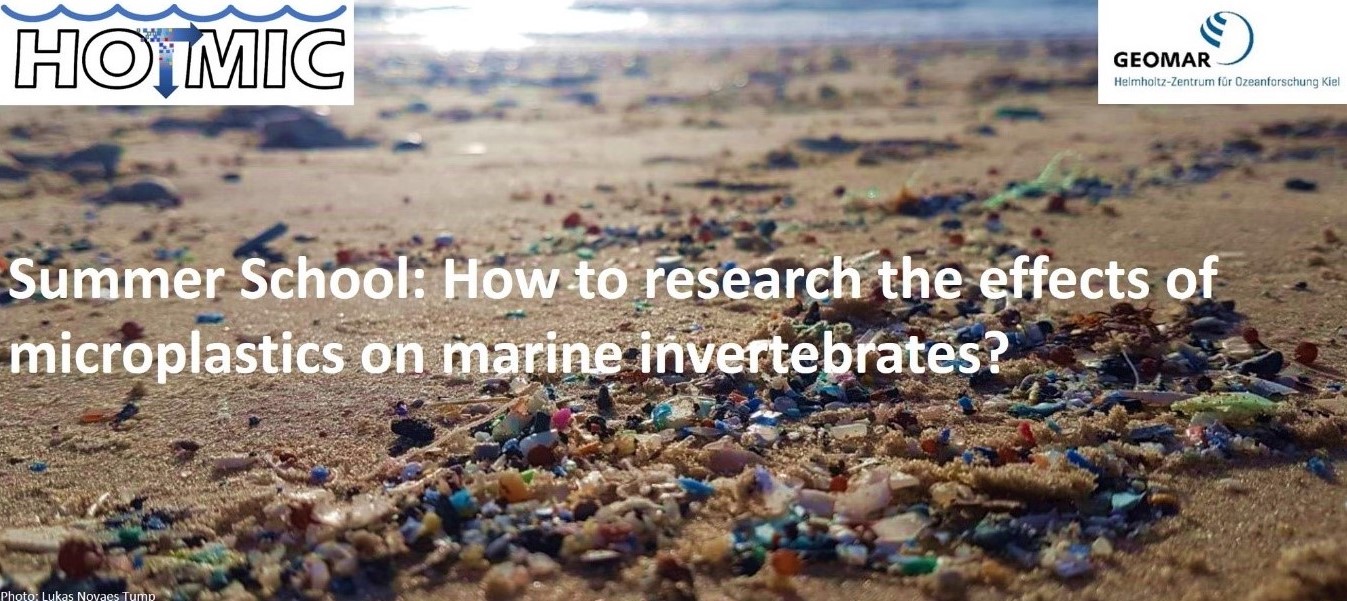In the framework of HOTMIC a summer school on microplastics will be held in September 2022.
Background
During the last decade, microplastics have been recognized as a globally emergent pollutant in aquatic and terrestrial environments and as such they received great attention by scientists, the media and politicians. However, we still know astonishingly little about their effects on life forms that ingest the microparticles. In this course, students will learn about how the potential impacts of microplastics on marine invertebrates are studied in laboratory experiments. They will learn from researchers who are active in this field how such experiments are designed and implemented. Furthermore, the course focusses on the procedures and techniques that are commonly used in microplastic exposure experiments and will explore to which degree their results can be extrapolated to natural systems. The course will be preceded by online lectures, which, on the one hand, reflect the state of the art in researching the consequences of microplastic pollution on marine life and, on the other hand, communicate general concepts that are relevant for the design of ecological experiments. The online lectures will take place in August/September 2022 and will be supplemented by a laboratory practical at GEOMAR Helmholtz Centre for Ocean Research Kiel in September 2022.
Objectives of the laboratory practical
Microplastics are omnipresent in marine ecosystems and it is known that more than 700 invertebrate and vertebrate species ingest them. A part of them does this because the small man-made particles resemble their natural food, while others ingest microplastics because they are intermingled with their food and remain undetected during feeding. While it is already established that the ingestion of microplastics can have negative consequences for the affected animals, we still lack knowledge about the factors that potentially influence the degree to which microplastics are ingested such as the weathering status of their surfaces or the presence of biofilms on the particles. Their influence on microplastic ingestion by the blue mussel Mytilus edulis will be investigated in a series of short-term laboratory exposure experiments at GEOMAR. The participants will expose blue mussels to microplastic particles that differ with regard to their weathering status and the presence of biofilms and will investigate how these characteristics affect particle ingestion by the blue mussels.
The course in short
A summer school in the framework of HOTMIC: Horizontal and vertical oceanic distribution, transport and impact of microplastics. Funded by JPI Oceans. www.hotmic.eu
When and where: The practical part will take place at GEOMAR in Kiel, Germany, from 19. – 23. September 2022. It will be prepared by online modules on August 29th, 30th and 31st.
Venue: GEOMAR Helmholtz Centre for Ocean Research Kiel
Main instructor: Dr. Mark Lenz, Marine Ecology Department, Benthic Systems
Virtual component description:
In the virtual component, the current state of experimental research on the effects of microplastics on marine life forms will be evaluated on the base of the existing literature. Methods and techniques will be discussed, limitations and caveats of previous experimental approaches will be identified, and potential future pathways for microplastic effects studies will be outlined. Researchers will report about their work on the effects of microplastics in talks and will answer questions of the participants.
Virtual component duration: 9 h
Virtual component timing: Before the practical part
City of venue: Kiel
Country of venue: Germany
Physical activity duration: 5 d
Start date: 19.09.2022
End date: 23.09.2022
Number of ECTS: 3
Main teaching/training language: English
Fee: None
Capacity limits: 22 students
Target group: biologists, environmental scientists
Level of course: Master- and Bachelor students

